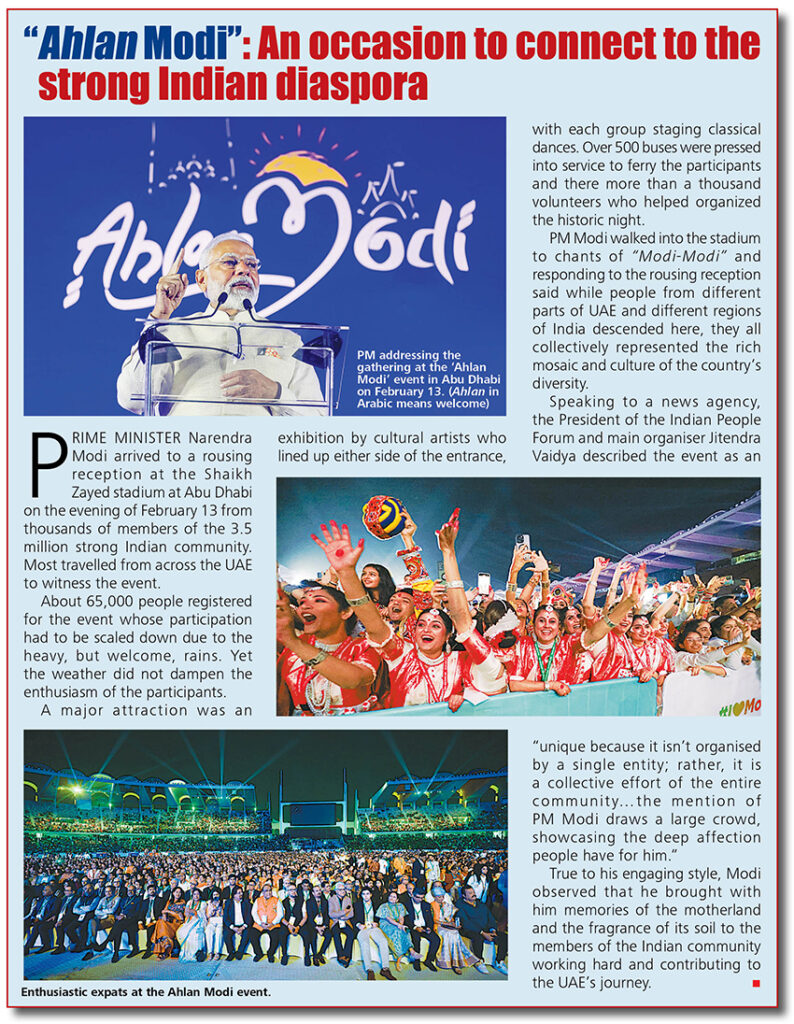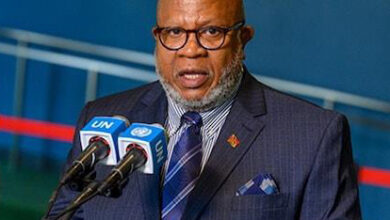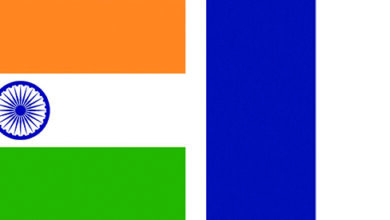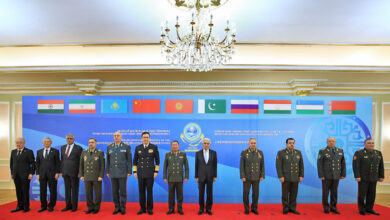PM Modi’s visit to UAE: A new high for the bilateral strategic partnership
By K V Prasad
New Delhi. Prime Minister Narendra Modi’s two-day sojourn to the United Arab Emirates was one of the rare occasions in the bilateral relationship on two prominent counts – President Sheikh Mohammed bin Zayed Al Nahyan accorded the honour of himself receiving PM Modi on his seventh visit to the Gulf nation during his decade-long tenure.
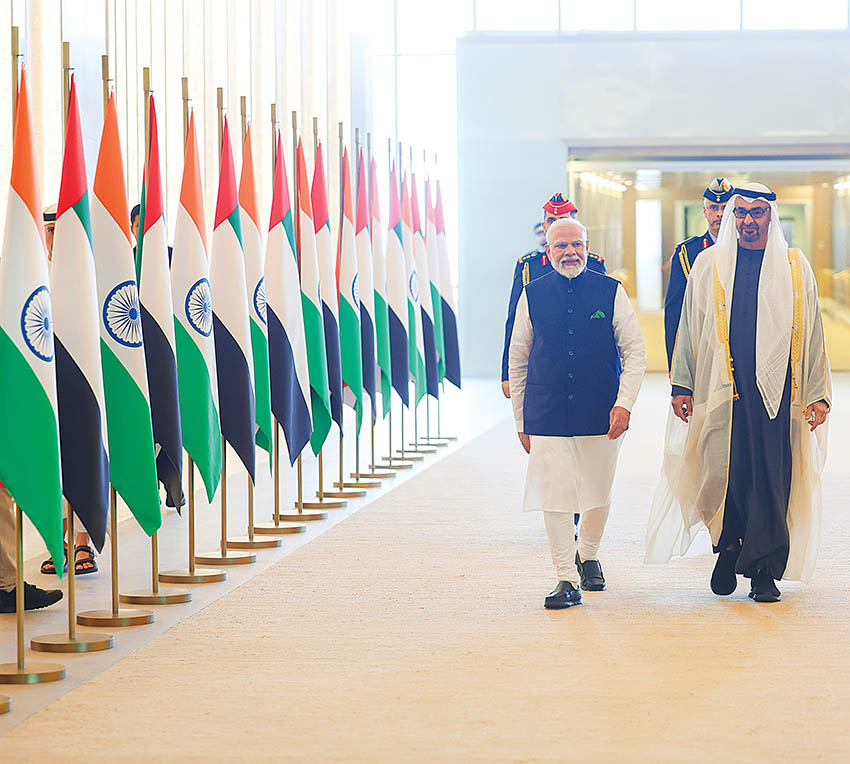
That PM Modi shares a special rapport with the UAE leadership was demonstrated during the February 13-14 trip to Abu Dhabi and Dubai.
On his part the Prime Minister captured the essence of his equation with UAE and its people likening it to visiting one’s own home. “Whenever I come here to meet you, I always feel I have come to meet my family. We have met five times in the last seven months, it is very rare and reflects our close relationship”, Modi observed while the President chose to address the guest as ‘Brother” which underscored the warmth.
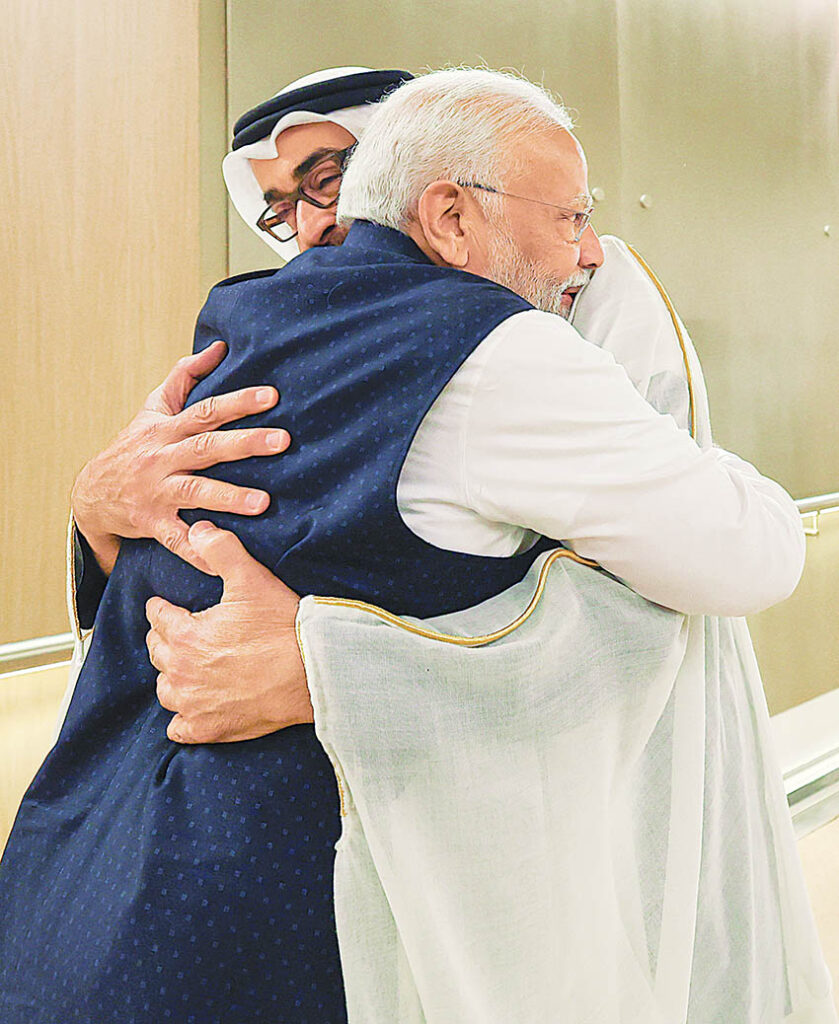
In recent times, the two leaders have had met on several occasions with PM Modi visiting the UAE twice during 2023 to take part in the COP and World Climate Action Summit, while President Sheikh Mohammed bin Zayed was in New Delhi for the G-20 and in January this year as a Guest of Honour at the Vibrant Gujarat Summit.
During the latest visit both leaders reviewed cooperation across several sectors including trade and investment, digital infrastructure, fintech, energy, infrastructure, culture and people-to-people ties.
Agreements and MoUs
The two leaders also held one-on-one talks and witnessed the exchange of several agreements and Memoranda of Understanding, a Ministry of External Affairs release said. The leaders agreed on strengthening the energy partnership and appreciated that in addition to the UAE being among the largest sources of crude and LPG, India is now entering into long term contracts for LNG.
The documents exchanged included a Bilateral Investment Treaty; an Intergovernmental Framework Agreement between India and UAE on the India-Middle East Economic Corridor; an Agreement on inter-linking domestic debit/credit cards – RuPay (India) with JAYWAN (UAE); and, Agreement on interlinking of the instant payment platforms – UPI (India) and AANI (UAE).
The Bilateral Investment Treaty will be the key to enable promotion of investments in both countries in both country. This treaty comes on the heels of the Comprehensive Economic Partnership Agreement (CEPA) between the two countries signed two years ago. CEPA is the first bilateral trade accord concluded by the UAE and India’s first bilateral trade agreement in the West Asia and North Africa region. India-UAE CEPA is a wide-ranging agreement, covering all aspects of India’s economic engagement with the UAE including Trade, Investments, Healthcare, Digital Trade, Government Procurement, IPR etc. CEPA, which came into force in May 2022, brought about new opportunities in bilateral trade and it is expected to increase the bilateral trade in goods to US $100 billion within five years and trade in services to US $15 billion. Currently, India-UAE bilateral trade is around $ 85 billion.
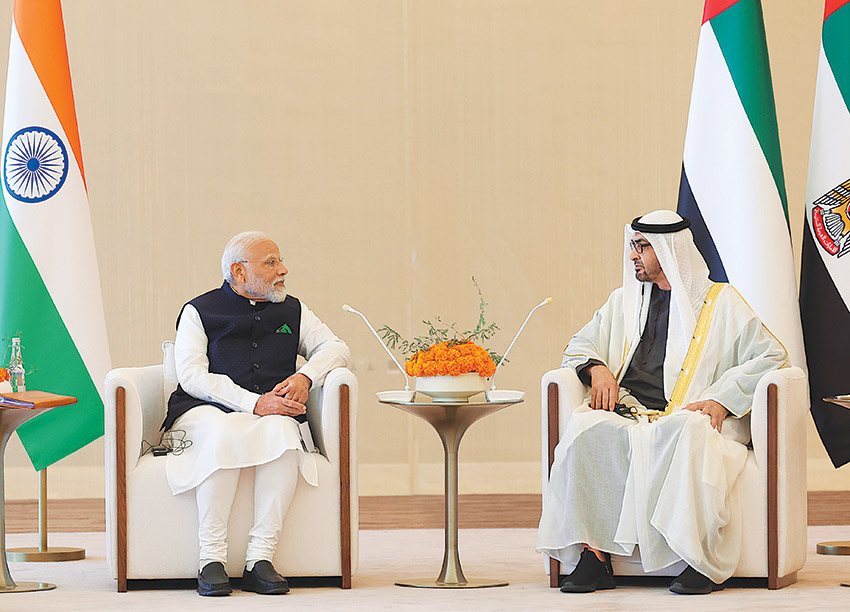
Setting into motion a new foray into Fintech, both leaders witnessed a transaction made using the JAYWAN card which is based on the digital RuPay credit and debit card stack. India and the UAE entered into two agreements, one interlinking RuPay and JAYWAN, an important step in building financial sector cooperation and raising the level of acceptance of RuPay across UAE. The other agreement to interlink instant payment platform, UPI and AANI (UAE) will permit seamless cross-border transactions between the two countries., The step follows the July 2023 MoU interlinking payment and messaging system.
Another significant development was the Intergovernmental Framework Agreement on the India-Middle East Economic Corridor (IMEC). It will take forward previous understanding and cooperation in this regard with the objective of both countries working to further regional connectivity. The IMEC was announced on the sidelines of the G-20 New Delhi Summit last September. On his part, Modi praised the vision of the UAE President and predicted that it will provide momentum to growth which will benefit future generations.
The MoU on cooperation in Digital Infrastructure Projects will create a framework for a wide ranging cooperation including investment cooperation in this sector and also allow sharing of technical knowledge, skills and expertise while the one in the field of electrical interconnection and trade holds the promise of opening new areas of collaboration in the field of energy, energy security and energy trade.
Ahead of the visit, RITES Limited signed an agreement with Abu Dhabi Ports Company and Gujarat Maritime Board with Abu Dhabi Ports Company. These would help in building port infrastructure and further enhance connectivity between the two countries.
On the concluding day of the visit, PM Modi delivered a keynote address at the World Government Summit in Dubai as a Guest of Honour and shared his thoughts on the altering nature of governance. He underscored the transformative reforms undertaken by India on the maxim of ‘Minimum Government and Maximum Governance”.
The summit was hosted by Dubai Ruler. Also the UAE Vice President and Prime Minister Shaikh Mohamed bin Rashid al Maktoum. His model of governance has turned Dubai into a beautiful, global marvel in infrastructure, just in four decades, and a hub in finance, tourism, investments, aviation and IT.
Dubai has had very strong ties with India traditionally, and is welcoming for all expats to come and invest, or work there. Those with innovative talents are welcomed with open arms.
PM Modi narrated to the distinguished audience, India’s experience as it leveraged digital technology to bring about fundamental change in delivering welfare schemes that reflects inclusivity and sustainability. He underscored that given the interconnected nature of the world, governments must collaborate and learn from each other to address future challenges.
The need of the hour, observed Modi, was to have governance that was inclusive, technologically smart, clean and transparent and green.
During the Dubai leg of the visit, he held discussions on a wide range of areas of cooperation including trade and investment, technology, space education and people-to-people ties with Sheikh Mohamed bin Rashid Al-Maktoum, who had personally invited him to visit this beautiful city.
Both leaders expressed satisfaction at the pace at which economic and commercial ties were growing, Prime Minister Modi’s Office (PMO) said. The two leaders acknowledged the key role played by the Comprehensive Economic Partnership Agreement and welcomed the move to sign the Bilateral Investment Treaty.
PM Modi expressed his deep appreciation to PM Mohamed bin Rashid for grant of land for an Indian Community Hospital in Dubai which will offer affordable healthcare facilities for Indian blue-collar workers. Both leaders also acknowledged the contribution of the Indian Diaspora in the evolution of Dubai into a global hub for trade, services and tourism.
Foundation stone for Bharat Mart
PM Modi and Shaikh Mohamed bin Rashid virtually laid the foundation stone of Bharat Mart at the Jebel Ali Free Trade Zone in Dubai. The Mart, to be built by Dubai’s DP World, is expected to take the India-UAE bilateral trade by leveraging the Port’s strategic location and strength in logistics.
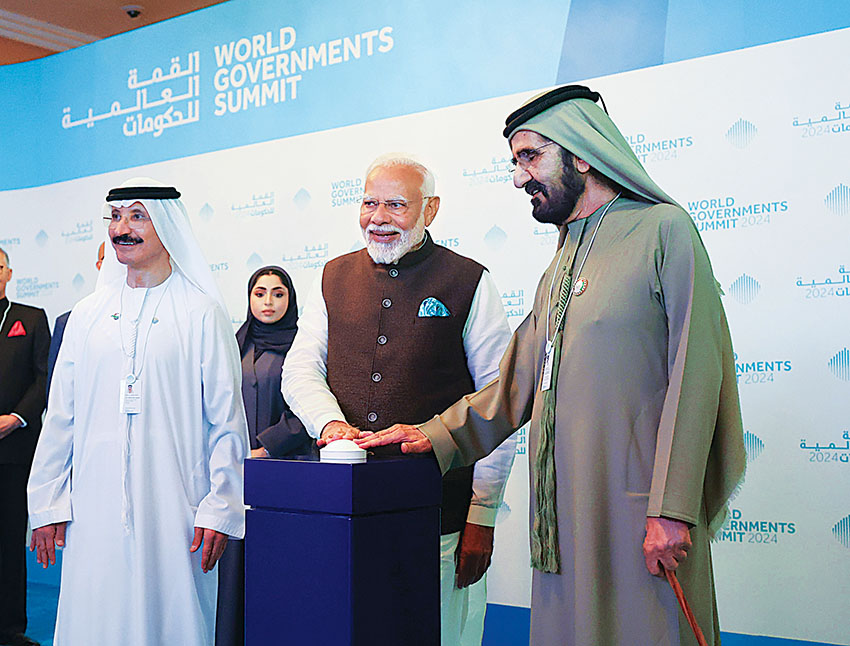
Bharat Mart, PM Modi said, has the potential to play an important role in promoting exports of the micro, small and medium sectors of India by providing them an effective platform to reach out to international buyers in the Gulf, West Asia, Africa and Eurasia.
Dubai is one of the seven Emirates that constitute the federation of the United Arab Emirates. Besides Abu Dhabi and Dubai, the other constituents are Sharjah, Fujairah, Umm la Quwain, Ajman and Ras al Khaimah.
India-UAE Joint Statement
The joint statement issued at the end of the visit, PM Modi and President Mohammed bin Zayed Al-Nahyan welcomed the decision the creation Bharat Mart. They said it will further promote bilateral trade and serve as a platform for enhancing the utilisation of CEPA by leveraging the strategic location of the port.
Relationships blooms in other areas
Besides taking note of the upswing in the nature of relationship, several agreements and foray into FinTech, in the joint statement the two leaders underscored the importance of a well-functioning and equitable multilateral trading system in fostering global economic prosperity and resilience, and stressed the importance for the 13th WTO Ministerial Conference which would work towards achieving a meaningful outcome that serves the interests of all WTO Members and strengthens the rules-based trade order.
Energy
The two leaders discussed ways to enhance their bilateral partnership in the energy sector, which includes oil, gas, and renewable energy. They acknowledged the recent signing of two new long-term LNG supply agreements between ADNOC Gas and Indian Oil Corporation Ltd and Gas Authority of India Ltd (GAIL) for 1.2 MMTPA and 0.5 MMTPA, respectively. These agreements mark the beginning of a new era in the energy partnership between the two countries, and both leaders encouraged the companies to explore more such opportunities. Furthermore, the two sides agreed to advance their cooperation in hydrogen, solar energy, and grid connectivity.
Acknowledging that the Memorandum of Understanding in the field of Electricity Interconnection and Trade signed during the visit opens a new area of energy cooperation between the two countries, the leaders said it will also bring to life the Green Grids – One Sun One World One Grid (OSOWOG) initiative launched by Prime Minister Modi during COP 26. They expressed confidence that the MoU would further boost energy cooperation and connectivity between both countries.
Cultural and Educational connect, and IIT
Both leaders noted that the cooperation protocol between the National Archives of the two countries and the MoU for cooperation with National Maritime Heritage Complex at Lothal, Gujarat will help in restoring the centuries old roots of India-UAE relationship and preserving the treasures of shared history.
The two leaders appreciated the commencement of the first Master’s programme in Energy Transition and Sustainability by the Indian Institute of Technology (IIT) Delhi in Abu Dhabi, the first IIT in West Asia. They reiterated the shared commitment of both countries for cooperation in education and research with a focus on advanced technologies, Artificial Intelligence, and sustainable energy.
Reviewing the progress of establishing the UAE-India Culture Council Forum and the membership of the council from both sides, the two leaders also emphasized the role of cultural and knowledge diplomacy in shaping a deeper mutual understanding that benefits both nations.
BAPS Temple
The PM also graced over a function at Abu Dhabi. It was the inauguration of the Bochasanwasi Akshar Purushottam Swaminarayan Sanstha (BAPS) Temple, the first Hindu shrine in the country. Ahead of its formal inauguration, the consecration ceremony was held by the priests who conducted the rituals.
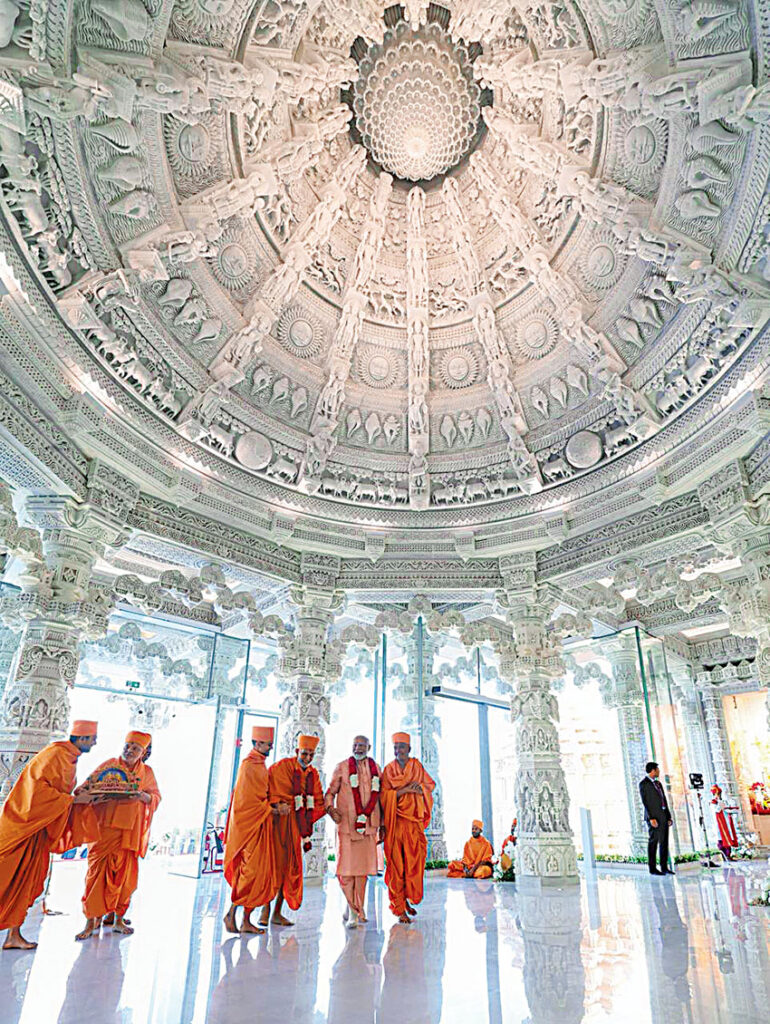
The 108-feet temple is built in the Nagara style of architecture and stands in the desert of Abu Mureikha. It was constructed by 1.8 lakh cubic meters of sandstone transported to Rajasthan. It is estimated to have been built at a cost of Rs. 700 crore and built on 13.5 acres of land.
In 2015, the land was gifted as a special gesture to the Indian community by Shaikh Mohammed bin Zayed, the then Crown Prince of Abu Dhabi. P
Modi recalled that during that visit, he had expressed to the Crown Prince desire for a land and soon it was granted stating: “…when I presented to him (Sheikh Mohamed bin Zayed) the proposal to build a temple in Abu Dhabi on behalf of all of you, he immediately said yes to it…now the time has come to inaugurate this grand (BAPS) temple,” he said at the Ahlan Modi event. Ahlan in Arabic means welcome.
